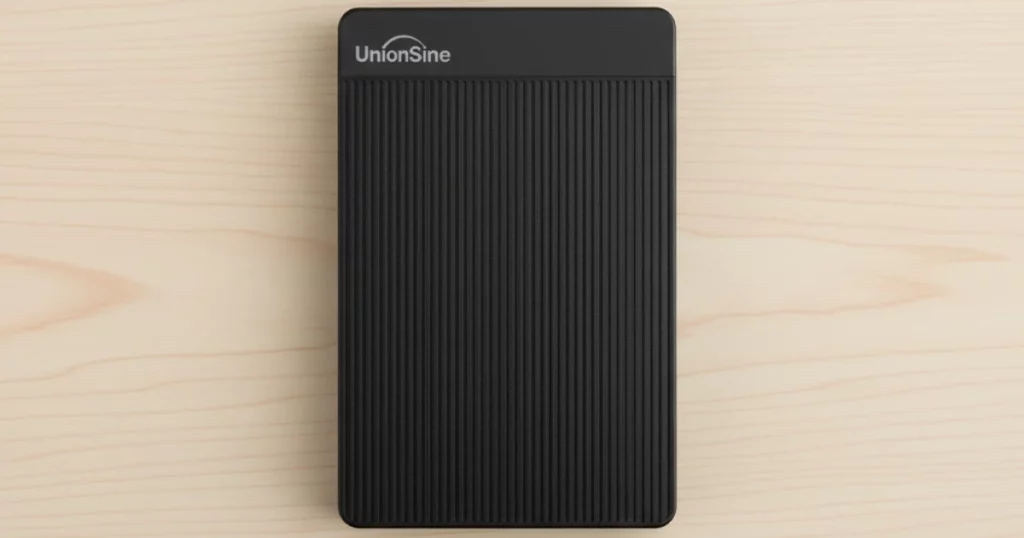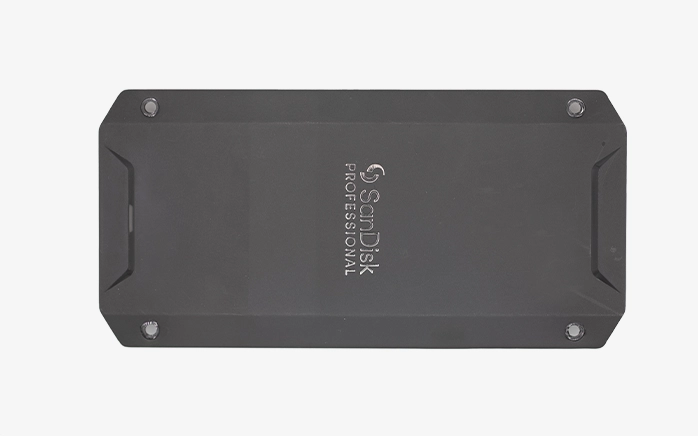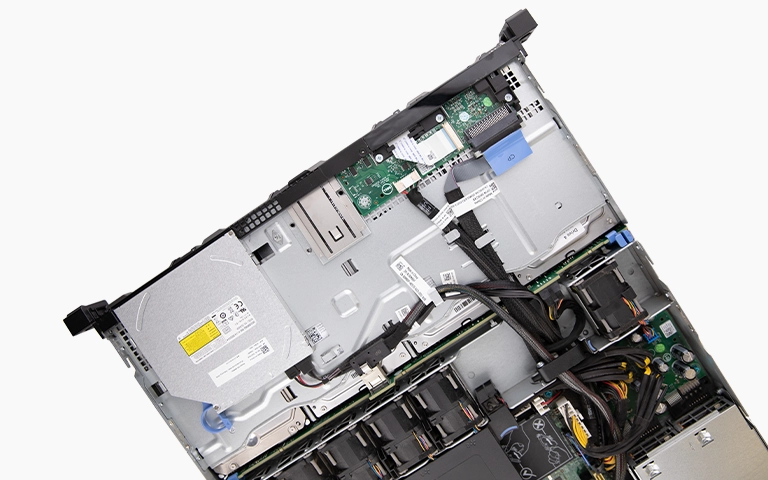MicroSD cards are a common storage solution in cameras, smartphones, drones, and other portable devices. Despite their size, they store vast amounts of valuable data like photos, videos, and documents. When they fail, especially those with a monolithic structure, recovering the data requires precision engineering, advanced tools, and a deep understanding of NAND flash systems.
At PITS Data Recovery, we specialize in monolith-level MicroSD recovery using advanced diagnostics such as pinout map analysis, X-ray scanning, and logical oscilloscopes to extract inaccessible data. Below, we break down our process and share a recent success story to highlight the complexity and precision required in these cases.
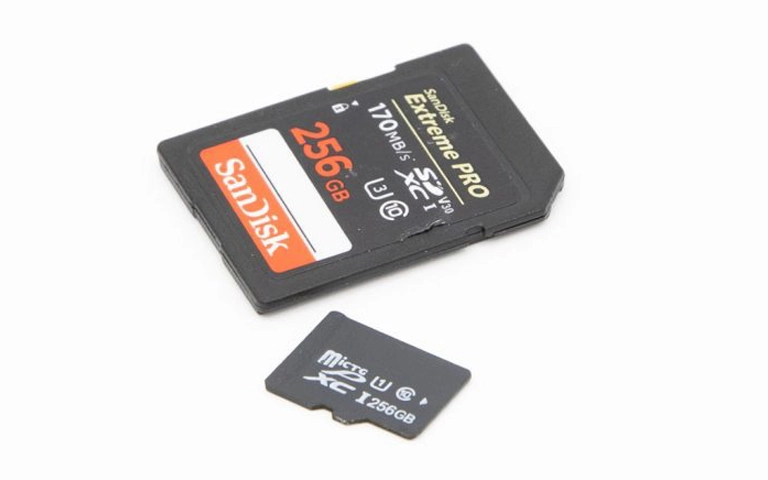
Why MicroSD Cards Fail and Software Isn't Enough
MicroSD failures may result from:
- Sudden power surges or removal during write operations
- Internal solder joint failure
- Physical wear or water damage
- Corrupted file systems or voltage instability in the host device
While some users try DIY tools, standard data recovery software is ineffective when the controller or internal circuits fail. Worse, such attempts can overwrite valuable data, making recovery harder or impossible. That’s why professional recovery is essential for failed MicroSD cards, especially monolithic types where chips and connectors are embedded in one piece.
What to Do When Your MicroSD Card Fails
To avoid further damage:
- Stop using the card immediately
- Do not reinsert it into different readers or devices
- Avoid formatting or using free recovery tools
- Consult professionals with monolithic chip expertise
Case Study: SanDisk MicroSD Card Recovery via Pinout Mapping
We recently received a SanDisk Ultra Plus MicroSD card that stopped responding after the user tried to transfer files using a third-party card reader. The card contained irreplaceable family photos, and the client feared they were lost forever.
Our engineers immediately began the diagnostic process to evaluate the card’s structure and determine whether data recovery was feasible.
Step 1: X-ray Scanning and Visual Analysis
Since the card was a monolithic MicroSD, we started with X-ray scanning to visualize the internal layout of the NAND flash chip and determine whether there were any breaks in the internal wiring or short circuits.
This non-destructive method helped confirm that the chip was intact and allowed us to map out potential connection points without damaging the card further.
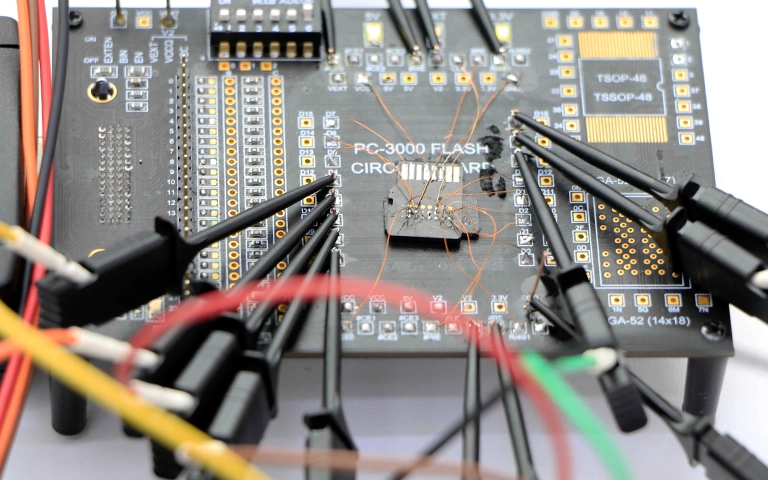
Your Data Security Is Our Priority
Data privacy isn’t optional. It’s our commitment. Our secure recovery process ensures your sensitive information stays protected from start to finish.
Trust in certified security. Start your recovery today! Call Now: 888.611.0737
Step 2: Pinout Identification with Logical Oscilloscopes
After confirming the internal structure, we used a logical oscilloscope to identify active signal lines. This device helps us understand the response behavior of the chip, especially for data I/O, clock, chip-enable, and power lines.
Combined with our internal proprietary pinout database, we carefully mapped the connections and exposed the necessary pads using a controlled abrasion technique. Any protective varnish or coating was removed with precision tools under a microscope.
Step 3: Soldering to a Custom Adapter and Initial Dump
Combined with our internal proprietary pinout database, we carefully mapped the connections and exposed the necessary pads using a controlled abrasion technique. Any protective varnish or coating was removed with precision tools under a microscope.
We verified the signal strength and began dumping raw data from the NAND flash.
Step 4: Rebuilding the RAW File System
The dumped data revealed that the card’s file system was in RAW format, likely due to corruption or internal wear. A RAW system means the card cannot be accessed normally by any OS.
Using forensic data recovery software, our engineers scanned for known file signatures, including JPEG, MP4, and MOV formats. We reconstructed directory structures, recovered files from fragmented sectors, and verified image integrity using metadata.
More than 95% of the files were successfully recovered, including high-resolution family photos that were previously inaccessible.

Get a Free Consultation.
Our recovery experts are ready to assess your device and guide you through the safest path to recovery. Fill out the form to get started.
"*" indicates required fields
Why MicroSD Recovery Is Technically Demanding
Recovery from MicroSD cards, especially monolithic flash, is one of the most specialized and resource-intensive services in the monolith data recovery field.
Here’s why:
- Monolith structure hides components, requiring expertise to locate contact points
- X-ray scanning and oscilloscopes are needed to analyze internal structure and signal behavior
- Micro-soldering under a microscope is essential, as one mistake can destroy the chip
- Custom tools and adapters are required for each chip model and manufacturer
- Data structure knowledge is needed to reconstruct raw and fragmented file systems
We’ve spent over 10 years building our lab capabilities and technical knowledge, allowing us to handle cases most providers can’t.
Final Results and Client Satisfaction
Once the data was reconstructed, we securely transferred it to a new USB storage device and set up a remote session with the client for verification. The client was overjoyed to see their lost photos fully recovered and intact.
Following our internal protocols, the case was closed, and the data was safely wiped from our recovery systems.
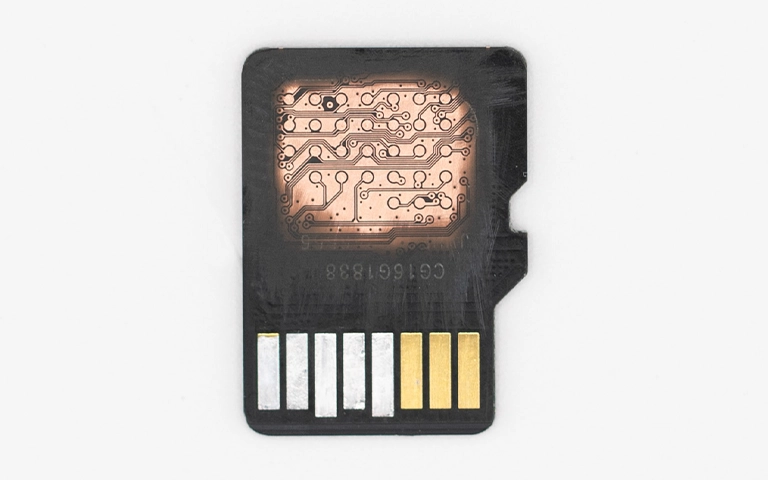
Conclusion
Recovering data from failed MicroSD cards is never simple. It requires X-ray scanning, signal analysis with oscilloscopes, monolithic soldering, and software capable of reconstructing raw file systems. This level of recovery is not possible with software tools alone.
At PITS Data Recovery, our experts have the tools, training, and experience to recover even the most complex MicroSD card failures. If your card has stopped working and the data is important, contact us today to start your recovery with confidence.
Let us help you retrieve what matters most safely, securely, and professionally.
Don't Let Data Loss Ruin Your Business
Minimize business disruption. We retrieve lost data fast, so you can focus on what matters.

